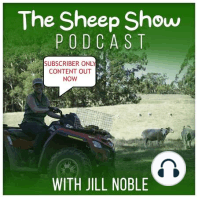37 min listen

Sheep gestation - A guide for you and your ewe!
Sheep gestation - A guide for you and your ewe!
ratings:
Length:
42 minutes
Released:
May 17, 2021
Format:
Podcast episode
Description
Lambing is the most important time of the shepherd's year. The sheep's, too. So, it's important to be prepared. Preparations include managing and feeding the sheep properly, getting the lambing facilities ready, and gathering necessary supplies. Preparing the Ewes Feeding and management during late gestation can determine success of the lambing season and sheep enterprise. While random problems occur, most problems can be prevented and result from improper feeding and management, especially during the last third of pregnancy. What's Happening During Late Gestation? Approximately 70 percent of foetal growth occurs during the last 4 to 6 weeks of pregnancy. Most of the ewe's mammary (udder) growth is occurring during this period. In addition, her rumen capacity is decreasing. The primary result is the need for increased feed, primarily a more nutrient-dense diet. Extra nutrition is needed to support foetal growth, especially if there are multiple foetuses involved. Extra feed is needed to support mammary development and ensure a plentiful milk supply. The quantity and quality of colostrum is affected by nutrition. Extra nutrition will prevent the occurrence of pregnancy toxaemia (ketosis). It will ensure the birth of strong, healthy lambs that aren't too big and aren't too small. Birth weight is highly correlated to lamb survival. There is usually a quadratic relationship between birth weight and lamb survival.Nutrition During Late Gestation During late gestation, energy (TDN) is the nutrient most likely to be deficient. The level of nutrients required will depend upon the age and weight of the ewe and her expected level of production, i.e. singles, twins, or triplets. To meet the increased energy needs during this period, it is usually necessary to feed concentrates (grain). In addition, if forage quality is low, it may be necessary to provide a supplemental source of protein and calcium. Examples of late gestation feed rations | Forage | Grain | 3.5 to 4 lbs. of medium to good quality hay | 1.25 to 1.5 lbs. of concentrate | 4 to 5 lbs. of medium quality hay or pasture equivalent | 0.5 to 1 lb. of concentrate | Limit the roughage intake of ewe lambs and mature females carrying 3 or more foetuses | 1 lb. of grain per foetus It is important not to under- or overfeed ewes during late gestation. There are consequences to both. Inadequate nutrition may result in pregnancy toxaemia, small and weak lambs, higher lamb mortality, reduced quality and quantity of colostrum, poor milk yield, and reduced wool production (in the offspring) via fewer secondary follicles. Fat ewes are more prone to pregnancy toxaemia. They experience more dystocia (birthing difficulties). Overfeeding can result in oversized fetuses that the female cannot deliver on her own. It costs extra money to make ewes fat. Feed Management In addition to feeding the right ration, you must also practice good feed bunk management. All ewes should be able to eat at once. If there is inadequate feeder space, some ewes, especially the small, young, old, and timid ones, may not get enough to eat. Pregnant ewe lambs should be fed separately from mature ewes. Their nutritional requirements are higher than mature ewes because in addition to being pregnant, they are still growing. They may also have trouble competing for feeder space. Pregnant ewes should generally not be fed on the ground. This is one way that abortions are spread. An exception might be feeding on frozen ground. Selenium and Vitamin E Selenium and vitamin E are critical nutrients during late gestation. Low levels of selenium (Se) and/or vitamin
Released:
May 17, 2021
Format:
Podcast episode
Titles in the series (100)
Find your match with sheep by The Sheep Show podcast